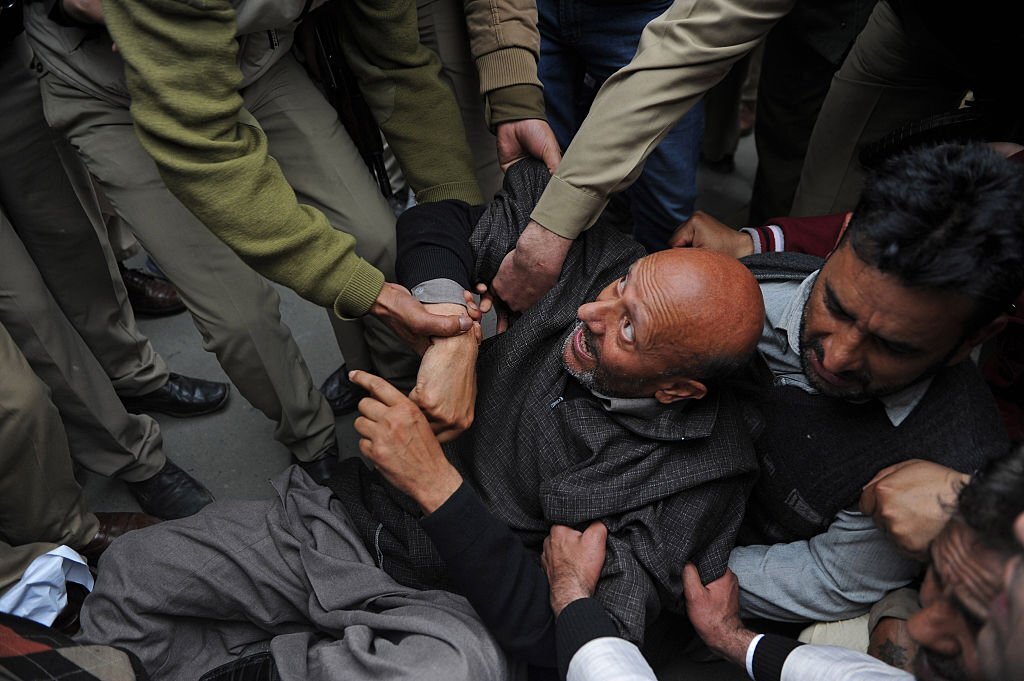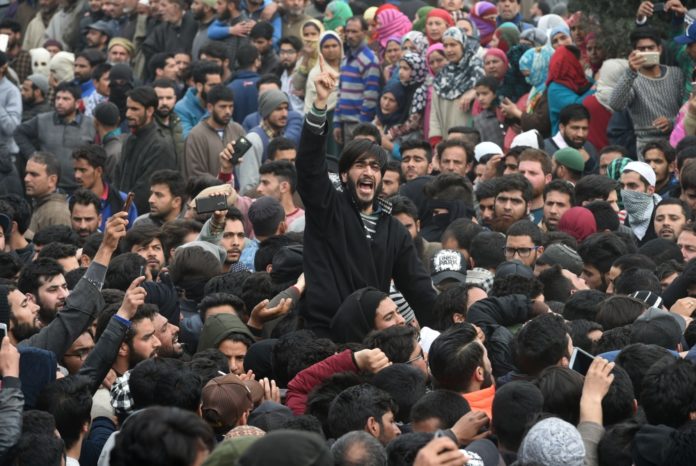The month of July has special significance with regard to the struggle of Kashmiri people. Two events “Martyrs day” and “Kashmir’s Accession to Pakistan day” are commemorated on 13 and 19 July respectively. Martyrs’ Day is observed in Kashmir and the world over in remembrance of 22 Kashmiris killed on 13 July 1931 due to reckless firing by the state forces of Dogra ruler. On that day Kashmiris were peacefully agitating outside the Central Jail Srinagar where an innocent Muslim Abdul Qadeer was being tried on the charge of terrorism and inciting public against the Maharaja of Kashmir. They were buried in the compound of Kanqah-i-Maula. The place is since known as Mazar-i-Shuhada (Tomb of Martyrs). So the Indian strategy of mixing up terrorism with legitimate struggle of Kashmiri people predates India’s independence from the British Raj.
A historic resolution was passed unanimously by the people of the Muslim-dominated state in a meeting of the All Jammu Kashmir Muslim Conference held at the residence of Sardar Muhammad Ibrahim Khan, the founder President of AJK on July 19, 1947 at Aabi Guzer in Srinagar demanding the then Dogra rulers to materialise the accession of the Jammu Kashmir state to Pakistan honouring the decision and the categorical viewpoint of the majority population of the Muslim-majority Jammu & Kashmir state. This day is marked as “Kashmir’s Accession to Pakistan day.
Fast Forward 2018
Kashmir continues to be occupied by India against the will of the Kashmiri people. Indian Occupied Kashmir is burning. Hundreds of Kashmiri men, women and children have been killed over the past two months; more than 150 civilians have been blinded by the use of lethal pellet guns; and more than 10,000 men, women and children have been seriously injured because of the indiscriminate firing by occupying Indian forces.
While Indian claims that pellet guns are non-lethal, the Doctors Association in Kashmir has clearly said that the embedded pellets in the bodies of the victims were causing fatal lead poisoning and were putting pregnant women at serious risk. Further, the toxic lead deposits in children’ bodies would stunt their growth. Kashmiris in IoK are under siege in their own land where the use of sexual molestation and rape as an instrument of state terror is a norm. Peaceful demonstrations are a crime, political meetings are banned and true representatives of Kashmiri people had been incarcerated. There are prolonged curfews and mobile telephone and internet blackouts in IoK. Indian occupation forces in the occupied territory are hunting down innocent citizens under draconian black laws. Today, hundreds of thousands of Kashmiris are campaigning against the Indian repression to attain freedom and realization of their right to self-determination.
Now two years after the martyrdom of Burhan Wani, his legacy for struggle for self-determination lives on. Martyrdom of Burhan Wani has infused new vigour in the indigenous freedom struggle of innocent Kashmiris who have been fighting for their right of self-determination for almost seven decades. Burhan Wani’s martyrdom has handed down the baton of freedom struggle to the youth of Kashmir, a fact recognized by a recently released report by the Office of the High Commissioner for Human Rights (OHCHR).
The silver lining is that awareness about the plight of Kashmiris is picking up momentum. Powerful voices are now taking note about HR violations in Kashmir. The latest in joining the ranks of those expressing serious concern over the quandary of religious minorities in India is the US State Department, which showed its disappointment over refusal of the Indian Government in allowing a delegation of the US Commission on International Freedom to visit the country to have first-hand knowledge of trampling of human and fundamental rights in India. This is for the third time that the delegation has been denied visas and the motives are quite understandable. And only recently, the UN Human Rights Council has documented details of what is happening with Kashmiris, urging the UN General Assembly and Security Council to take up the issue seriously. Though India claims to be the biggest democracy and champion of secularism, its denial of access to the outside world clearly means it has something to hide. National Prosecuting Authority (NPA) of South Africa has confirmed that it will be investigating Indian Prime Minster Narendra Modi for his involvement in war crimes and HR violations in Kashmir.
In a recent Conference, President Azad Jammu and Kashmir appealed to Canadian lawmakers to develop a bipartisan approach for the promotion and protection of human rights of Kashmiris in IoK. He made this appeal to the Canadian Senate and the House of Commons while addressing a Kashmir Conference at Hamilton, Canada, organized by the Pakistan Business Association of Hamilton. He especially urged the Human Rights Committees of the Canadian Senate and the House of Commons to take note of the report on the human rights situation in IoK recently released by OHCHR, discuss it and support its recommendations. He highlighted two of the reports’ recommendations, namely, the establishment of a Commission of Inquiry by the Human Rights Council to ascertain facts on the ground and repeal of two draconian laws Armed Forces Special Powers Act and the Public Safety Act. The Conference was also addressed by Scott Duvall, Member of Canadian Parliament, Ken Stone of the Hamilton Coalition to Stop the War, Mr. Chris Macleod of Cross Border Litigation Group, and Dr. Zafar Bangash, Chairman of the Friends of Kashmir Committee.

Scott Duvall, MP, said that he would take back suggestion for focus on Human Rights Council’s Kashmir report in the Human Rights Committee of the House of Commons. Chris Macleod endorsed the idea that more attention must be given to the human right’s situation in IoK and in this regard the Human Rights Committees of the Canadian Senate and the House of Commons should play a role. Ken Stone said that the Kashmir Conference has been convened to hear the cries of the Kashmiris struggling against denial of self-determination in IoK. He said that in early 2017 he had visited Azad Kashmir and had found it to be truly free. In Azad Kashmir, unlike IoK, there was no presence of the Army in cities and towns, no gun-toting soldiers, no barricades and no sign of the people of AJK being repressed.
Despite India’s state terrorism and savage oppression, the people of Kashmir and Pakistan believe in peaceful means and would continue to urge India to resort to dialogue and diplomacy. It is the responsibility of the UN and the international community to avert a major war over Kashmir, which is a grave and potent risk. India should renounce the path of terrorism and violence and come back to diplomacy to resolve this issue within the political parameters defined by the UN Security Council Resolutions.
Stone said “occupation is a crime from Kashmir to Palestine”. And that solution given by the UN Security Council mandating a plebiscite to allow Kashmiris to determine their political future was the most viable, prudent and practicable dispensation. India is continuing occupation of IoK and brutalization of the Kashmir people in its attempts to illegally integrate the Occupied Kashmir to the Indian State.
The Kashmir Conference also passed a resolution which unanimously calls on the UN to assume its responsibility to organize the Kashmir plebiscite under its supervision; and urges the UN to investigate all massacres, gang rapes, fake encounters, forced disappearances and wilful blinding of the Kashmiris. The resolution also called upon India to cease forthwith all human rights violations in IOK; and called on its government to allow UN/ independent investigations into the human rights situation in IoK; and to withdraw all its troops including armed constabulary from Jammu and Kashmir, particularly from cities, towns and villages.
Back in 1949, Canada’s General AGL McNaughton, in his capacity as President of the Security Council had played an active role in the resolution of the dispute and on 22 December 1949 had proposed an impartial plebiscite in the territory to determine the future of Jammu and Kashmir and settle the dispute in accordance with the freely expressed will of its inhabitants.
The world must break the cycle of appeasement of India. While the world, especially the western countries know fully well that Indian occupation forces are on a murderous rampage in the IoK and are committing crimes against humanity there, even then, the majority of the western nations have chosen to be silent on the issue or look the other way. This encourages and rewards Indian impunity in IoK and is tantamount to complicity in the Indian crimes. Moreover, plebiscite is not a dated instrument; Canada has recently held a plebiscite in Quebec.




